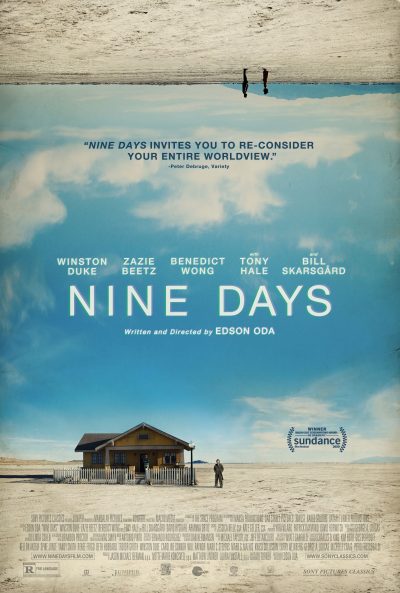
“Nine Days”(2020 production, 2021 release). Cast: Winston Duke, Zazie Beetz, Benedict Wong, Tony Hale, Bill Skarsgård, David Rysdahl, Arianna Ortiz, Perry Smith, Geraldine Hughes, Sterlin English, Erika Vasquez, Lisa Starrett. Director: Edson Oda. Screenplay: Edson Oda. Web site. Trailer.
Think you know what constitutes existence? Are you sure? A close look may reveal a picture far different from what we think we know, one that crosses dimensional lines and offers us infinite possibilities for exploration and experience – far more than we may have typically imagined and involving avenues for expression that are limited only by our imaginations. So it is for a group of souls seeking to find their way and to partake of the kaleidoscopic range of possibilities available to them in the thought-provoking new metaphysical drama, “Nine Days.”
In the midst of a barren desert landscape sits a solitary, nondescript frame house, with virtually nothing else in sight as far as the eye can see. The sole resident of the structure, Will (Winston Duke), spends much of his time watching video footage of assorted individuals on television sets stacked atop one another, making observations, writing notes about what he sees and carefully placing his reports in a room overcrowded with file cabinets. And, when he’s not methodically engaged in these activities, he visits a remote junkyard, collecting an odd assortment of items that he takes back home.
So who is Will, and what is he doing in this strange and desolate location? As events unfold, it’s revealed that he’s a sort of other-dimensional case worker who interviews aspirants to fill incarnational vacancies that become available in the physical world. In other words, he evaluates the character and fitness of various disincarnate souls to determine if they would make worthy candidates to be born and given life as we know it. He conducts his inquiries from a locale that’s described as being similar to corporeal existence only not as defined or intense. And, because his would-be incarnates have no experience with what we think of as the real world, he believes he needs to be scrupulously thorough in assessing their suitability for earning a shot at life. In doing so, Will puts the candidates through their paces over the course of nine days, objectively and meticulously appraising the performance through a series of tests and hypothetical situations.
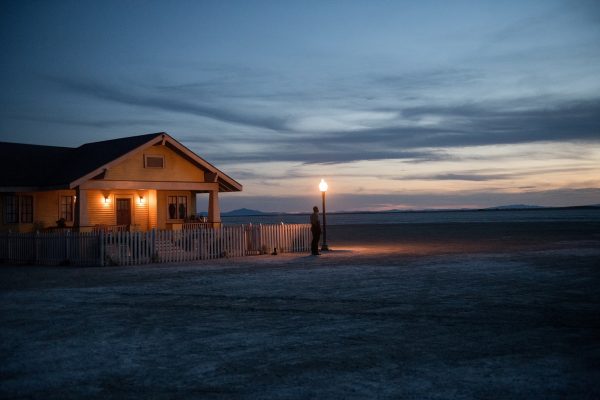
Those who are deemed worthy are chosen; those who are not are reconciled to oblivion. To many, this might seem like a highly judgmental process. But, considering what candidates will likely face once incarnated, only those thought to be suitable qualify.
So what makes Will qualified to do this kind of “work”? Having experienced physical life personally, he’s acquainted with what it takes to be born into corporeal existence. He’s aware of the rigors inherent in such an undertaking, and his track record has provided him with the qualifications for evaluating the capabilities of others seeking to follow suit. But, as becomes apparent, one might question Will’s aptitude for such a vocation. Having evidently endured a less-than-satisfying time during his physical incarnation, Will seems somewhat sour on the idea of terrestrial existence, though he tends to keep mum on the particulars behind this. So, as he goes about his work, he generally approaches it with a stoic, unemotional attitude, in many ways mirroring the less defined, less intense nature of the dimension in which he dwells.
With the death of one of the souls that Will selected for being born, he’s left with a vacancy to fill. He begins the assessment process, evaluating the merits of a pool of candidates, including Mike (David Rysdahl), an eager, childlike but neurotic soul with low self-esteem and a wealth of uncertainty about what he may be embarking upon; Alexander (Tony Hale), a jocular, playful sort who doesn’t always seem to take the process seriously but is anxious to experience life’s simple joys; Maria (Arianna Ortiz), a hopeful but sometimes-desperate candidate who often comes across as a somewhat overzealous people pleaser; and Kane (Bill Skarsgård), a pragmatic but selfish, often-cold operator with razor-sharp insights backed by a pessimistic, calculating demeanor and a firm belief in survival of the fittest.
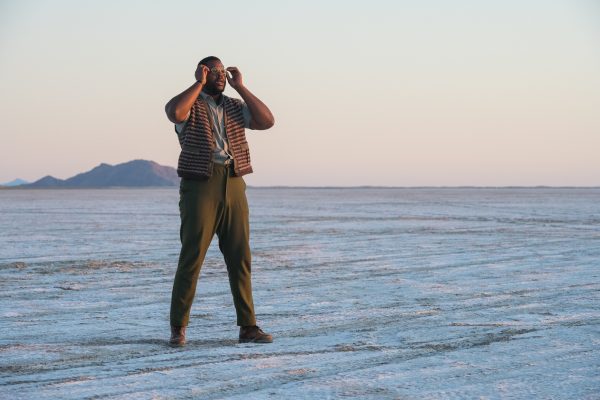
And then there’s Emma (Zazie Beetz), a free spirit who plays be her own rules, including showing up according to her own timetable and processing assignments in unconventional ways, frequently confounding her interviewer. Will often tries to “correct” her, but she’ll have none of it, taking matters into her own hands and doing things her own way, whether or not he approves. Despite his skepticism and disapproval, though, Will is quietly captivated by Emma, his frustration with her attitude notwithstanding. But there’s also something about her that gets under his skin, and, as becomes apparent, it has more to do with his view of himself than with her.
As the evaluation process unfolds, Will also finds himself engaging in some often-painful introspection regarding the death of Amanda (Lisa Starrett), his selection who passed away and left him with the vacancy he’s now seeking to fill. He wonders what went wrong, blaming himself for failing at a task that was, for all practical purposes, out of his hands. He meets with a fellow interviewer, Colleen (Geraldine Hughes), who tries to assuage his guilt, but even that does little to lift his spirits and change his outlook.
Through all of this, Will is frequently accompanied by Kyo (Benedict Wong), a soul who has never incarnated. Kyo fulfills multiple roles, including confidante, sounding board, devil’s advocate and de facto mentor, not to mention a companion for his late night junkyard visits. This light-hearted, jovial sidekick impishly provides insights that Will never considered, and, ironically, he seems to know a lot about life for someone who has never experienced it firsthand. He also unwittingly plays a pivotal role in the unfolding of the evaluation process, especially where Emma is concerned, a kindred spirit who shares many of his perspectives.

As the nine days pass, Will and the candidates go through an intense array of experiences, emotions and interactions. But, as the deadline nears, it becomes increasingly unclear exactly what will result and who will get picked. One thing is for sure, though: the story becomes a metaphysical tango in which evaluator and the evaluated end up becoming mirrors for one another, unwittingly switching roles in teaching and learning life lessons, regardless of which reality those instructions may ultimately be applied to. It seems there are always things to be learned, no matter what dimension we may occupy, as the characters in this enlightening saga discover for themselves.
If one were to ask most people about their views of what constitutes existence, many of them would probably offer explanations that they believe to be well-defined and clear-cut in nature. However, they would also likely provide accounts that are comparatively limited in scope, falling far short of what’s presented in films like this. In doing so, they unwittingly embrace an outlook that only scratches the surface of what comprises reality, cutting themselves off from the expansive nature of existence in all its permutations.
So how does one expand his or her view to bring it up to a level more in line with what more adequately approximates this wider outlook on existence? It has to do with a shift in beliefs, particularly those that make allowances for an enlarged perspective, an outcome that’s possible through the conscious creation process, the philosophy that maintains we draw upon these resources in manifesting the reality we experience. And that’s something essential to understanding what the characters are experiencing in “Nine Days.”
As the disincarnate souls seek their chance at experiencing physical existence, they learn about its nature and how they might fit into it, based on the beliefs they hold. It’s all new to them, a blank canvas on which they can create whatever they choose to live through, and Will’s inquiries are an attempt to find out what they would do with the opportunity. In this other-dimensional space, they come to learn about a foreign plane of existence that’s different from anything they’ve experienced before. That, in itself, is a broader view of reality that they – and probably many of us – have never previously considered, as becomes apparent in their reactions to what their potential upcoming odyssey might be like.
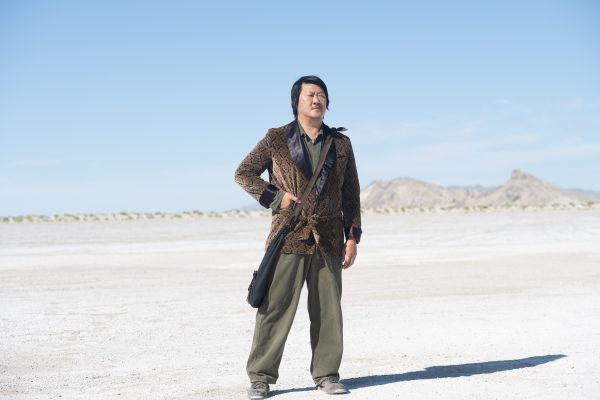
Imagine the sense of wonder to come out of a realization such as this. And imagine if we were open-minded enough to do the same. Think of the unexplored possibilities and what we might be able to do with them. On top of that, there are additional possibilities for personal growth and development within a particular dimension, such as the aforementioned instances of mirror imagery and role switching. These episodes provide even more opportunities for personal enrichment.
But, as the film further reveals, what if there were even more to existence than just physical reality and this other-dimensional plane? Consider what that would mean for our view of existence. Think of what it would also do for individuals like Will, who would now have the potential to discover possibilities for being that transcend even their already-expanded view. Moreover, as Kyo speculates in one scene, what if Will’s surveillance of those whom he’s selected to physically incarnate is only one link in a potentially endless chain of dimensional observation, one in which someone is watching him from another plane of existence, who, in turn, is being watched by someone else, who, in turn, is being watched by yet someone else, and so on into infinity? Such a scenario would suggest an infinitely rich, multi-layered paradigm that goes far beyond anything the characters in the film – and, again, many of us – have ever considered. (It’s ironic that this possibility is suggested by Kyo, someone who has never before experienced physical life firsthand; for someone whose soul experience is seemingly so restricted, he appears to know much about a subject that extends far beyond what he has personally gone through.)
Through all of this, though, what’s most important is what we believe about the nature of existence, especially when it comes to defining our individual selves. Each of the aspirants, for example, has his or her own view of what they would like to make of their opportunity to physically incarnate. It defines both what they wish to create and who they are as individuals. And, in this story, that also applies to those who reside in the other-worldly dimension, namely, Will and Kyo, for their beliefs shape their existence, even if it unfolds on a plane different from ours.
As we undergo these experiences, it’s important to remember that we’re the ones in the driver’s seat, that our beliefs determine what materializes. In that regard, then, we need to be cognizant of the possible impact of the beliefs of others upon us. For instance, as Emma so clearly demonstrates, she employs her beliefs to manifest what she wants, despite Will’s attempts at “correction.” Likewise, as Will seeks to impose his beliefs on others, he runs the risk of creating undue judgment, a powerful force that can easily boomerang on him as others seek to deflect it and send it back to its source. And, in any materialization scenario, depending on the beliefs employed, if we’re not careful, we run the risk of letting ill-defined beliefs creep into the manifestation mix, producing camouflage that obscures the clarity of what we’re seeking to create. These scenarios all have the potential to make their presence felt in any of these dimensions, too, creating conundrums for their creators, no matter where these materializations appear.
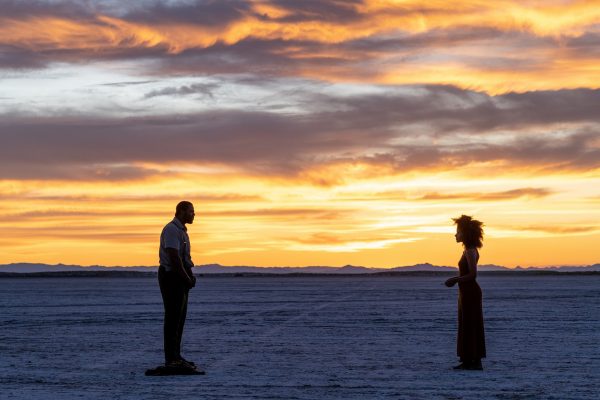
Regardless of what arises, we should always remember that we’re not stuck with what create. While beliefs may be extremely powerful and persistent, they’re also exceedingly malleable, capable of being reshaped and refined in ways that enable us to manifest what we desire, no matter what plane of existence we may find ourselves on. With that in mind, there’s no telling what we may be able to manifest. The possibilities are endless, not unlike the dimensions of reality at our disposal and available for exploration and experience.
Adequately expressing the expansive nature of existence in all its various permutations is far from an easy feat in any artistic milieu. But director Edson Oda has done a more than commendable job in his debut feature, a nuanced metaphysical drama that captivates throughout. While the narrative is occasionally a little too elusive for its own good, all is gradually and eventually revealed, making for an exceedingly thought-provoking cinematic and philosophical experience. The picture’s minimalist but inventive production design, innovative editing and fine performances (particularly protagonist Winston Duke, who reveals acting chops most viewers probably never realized he possessed) combine for an intriguing and insightful tale, one that will have audience members talking about at length afterward. This little-known indie gem, strongly influenced by such offerings as “Wings of Desire” (1987), “After Life” (1998) and “The Tree of Life” (2011), is a must-see for those who appreciate cinema that’s both entertaining and enlightening and who like to leave the theater with something to ponder long after the flickering on the screen stops.
The long-delayed release of this offering due to the COVID pandemic may have been frustrating for cinephiles, but it was nevertheless worth the wait. Despite the postponement, the picture still managed to garner attention during the 2020 movie awards season, capturing two Independent Spirit Award nominations for best first feature and for Benedict Wong’s fine supporting actor performance. “Nine Days” is currently playing in limited theatrical release, primarily in moviehouses specializing in independent and arthouse films.
They say there’s more to life than we can possibly know, and, in our current frame of mind, that argument rings true for many of us. However, if we were to open our minds by expanding our range of beliefs, we could provide ourselves with an opportunity to see what else is out there and to realize that our existence is far more magical and magnificent than we ever envisioned. We could access an infinite range of means to discover ourselves and our capabilities, enabling the revelation of previously unknown talents and the ability to rectify shortcomings and past misgivings. This brave new way of looking at life has the power to drastically reshape our existence and, along with it, us.
Copyright © 2021, by Brent Marchant. All rights reserved.

No comments:
Post a Comment